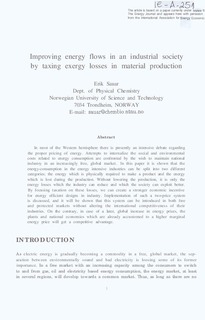| dc.contributor.author | Sauar, Erik | nb_NO |
| dc.date.accessioned | 2014-12-19T12:35:01Z | |
| dc.date.available | 2014-12-19T12:35:01Z | |
| dc.date.created | 2007-03-07 | nb_NO |
| dc.date.issued | 1998 | nb_NO |
| dc.identifier | 122195 | nb_NO |
| dc.identifier.issn | 1944-9089 | |
| dc.identifier.uri | http://hdl.handle.net/11250/242689 | |
| dc.description.abstract | In most of the Western hemisphere there is presently an intensive debate regarding the proper pricing of energy. Attempts to internalize the social and environmental costs related to energy consumption are confronted by the wish to maintain national industry in an increasingly free, global market. In this paper it is shown that the energy-consumption in the energy intensive industries can be split into two different categories; the energy which is physically required to make a product and the energy which is lost during the production. Without lowering the production, it is only the energy losses which the industry can reduce and which the society can exploit better. By focusing taxation on these losses, we can create a stronger economic incentive for energy efficient designs in industry. Implementation of such a two-price system is discussed, and it will be shown that this system can be introduced in both free and protected markets without altering the international competitiveness of their industries. On the contrary, in case of a later, global increase in energy prices, the plants and national economies which are already accustomed to a higher marginal energy price will get a competitive advantage. | nb_NO |
| dc.language | eng | nb_NO |
| dc.publisher | International Association for Energy Economics | nb_NO |
| dc.title | Improving Energy Flows in a Industrial Society by Taxing Exergy Losses in Material Production | nb_NO |
| dc.type | Journal article | nb_NO |
| dc.description.version | Submitted version | |
| dc.source.journal | Energy Journal | |
| dc.contributor.department | Norges teknisk-naturvitenskapelige universitet, Fakultet for ingeniørvitenskap og teknologi, Program for industriell økologi | nb_NO |
